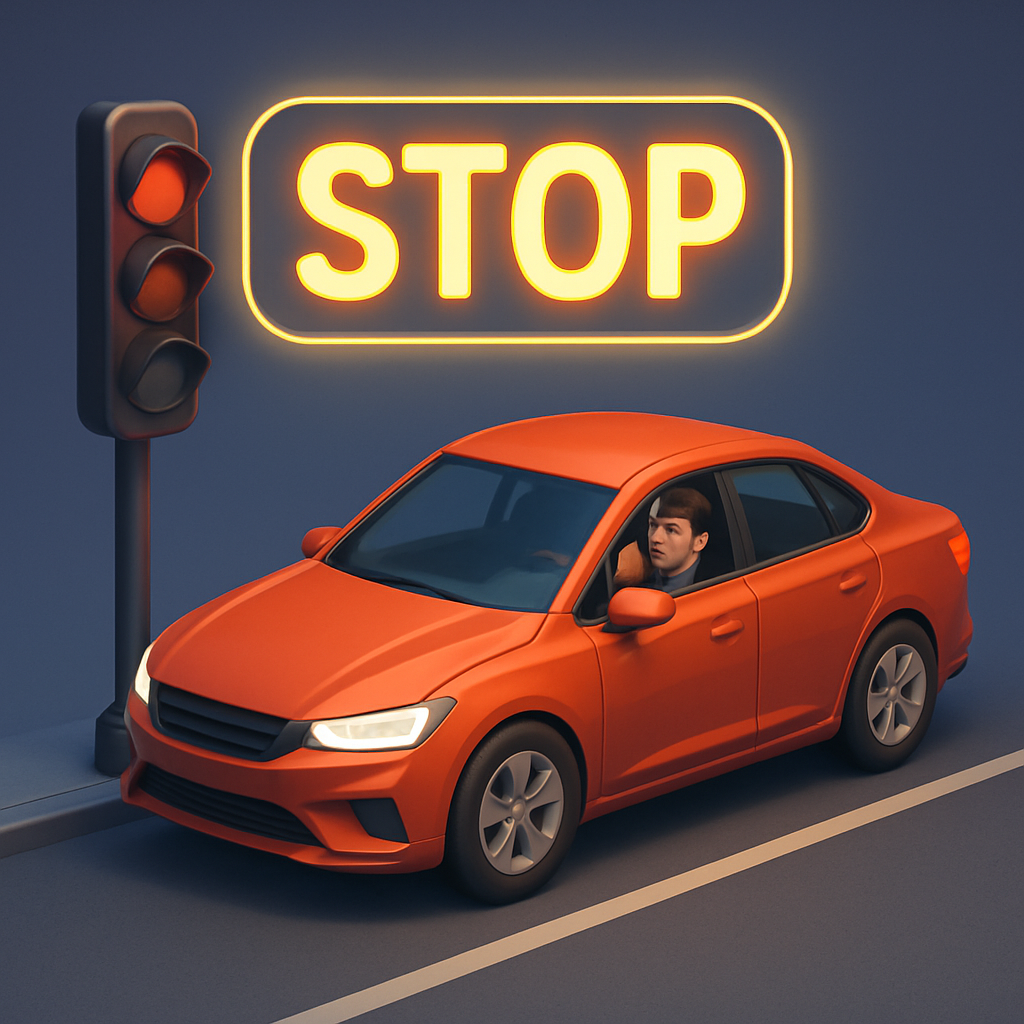Stop
Definition
Stop refers to the act of ceasing movement, activity, or progress. It can also describe a physical barrier or mechanism that halts or prevents movement.
Parts of Speech
- Verb
- Noun
Pronunciation
American English
- IPA Pronunciation: /stɑp/
- Respelling: STAH-p
British English
- IPA Pronunciation: /stɒp/
- Respelling: STOP
Etymology
The word "stop" originates from Old English "stoppian," meaning "to close or block," influenced by Middle Dutch "stoppen." It is related to Proto-Germanic "*stuppōną," which conveys the idea of blocking or halting.
Derivatives
- Stopped (adjective/verb)
- Stopping (verb)
- Stopper (noun)
- Unstoppable (adjective)
- Nonstop (adjective/adverb)
Synonyms
- Halt
- Cease
- Pause
Antonyms
- Start
- Continue
- Proceed
Usage
The word "stop" is commonly used to describe the action of halting or pausing, such as "Please stop the car." As a noun, it refers to a place where vehicles halt, such as a bus stop. It is also used metaphorically, such as "a full stop" in writing.
Related Terms
- Halt: A temporary or permanent cessation.
- Pause: A brief cessation or interruption.
- Barrier: A physical or metaphorical obstruction.
Detailed Definitions
Verb
- To cease movement or action: Refers to halting an ongoing activity.
- Example: "The driver was asked to stop at the red light."
- To prevent or block movement: Describes impeding the progress of something.
- Example: "He stopped the leak with a patch."
- To refrain from continuing: Indicates discontinuing a behavior or action.
- Example: "You should stop worrying about the test."
Noun
- A place or point where movement ceases: Refers to a designated location where a vehicle halts.
- Example: "The bus stop is right around the corner."
- A punctuation mark (period): Indicates the end of a sentence in writing.
- Example: "The sentence ended with a full stop."
- A mechanical device that halts movement: Refers to a tool or mechanism used for stopping.
- Example: "The door stop prevented it from slamming shut."
stop



🇨🇳 Mandarin (Chinese)
- 停止 (tíngzhǐ) – stop (action)
- IPA Pronunciation: /tʰǐŋʈʂɨ̀/
- English Respelling: ting-zhi
- 站 (zhàn) – stop (place)
- IPA Pronunciation: /ʈʂan˨˩˦/
- English Respelling: zhan
🇮🇳 Hindi
- रोकना (roknā) – stop (action)
- IPA Pronunciation: /roːknaː/
- English Respelling: rok-naa
- ठहराव (ṭhahrāv) – stop (place)
- IPA Pronunciation: /ʈhəɦraːʋ/
- English Respelling: tha-hraav
🇪🇸 Spanish
- Parar – stop (action)
- IPA Pronunciation: /paˈɾaɾ/
- English Respelling: pa-rar
- Parada – stop (place)
- IPA Pronunciation: /paˈɾaða/
- English Respelling: pa-ra-da
🇫🇷 French
- Arrêter – stop (action)
- IPA Pronunciation: /a.ʁe.te/
- English Respelling: a-re-te
- Arrêt – stop (place)
- IPA Pronunciation: /aʁɛ/
- English Respelling: a-re
🇸🇦 Modern Standard Arabic
- قف (qif) – stop (action)
- IPA Pronunciation: /qif/
- English Respelling: kif
- محطة (mahatta) – stop (place)
- IPA Pronunciation: /maħatta/
- English Respelling: ma-hatta
🇧🇩 Bengali
- বন্ধ (Bōndha) – stop (action)
- IPA Pronunciation: /bɔnd̪ʰɔ/
- English Respelling: bon-dho
- থামা (Thāmā) – stop (place)
- IPA Pronunciation: /ʈʰama/
- English Respelling: tha-ma
🇷🇺 Russian
- Стоп (Stop) – stop (action)
- IPA Pronunciation: /stop/
- English Respelling: stop
- Остановка (Ostanovka) – stop (place)
- IPA Pronunciation: /ɐstɐˈnofkə/
- English Respelling: os-ta-nov-ka
🇵🇹 Portuguese
- Parar – stop (action)
- IPA Pronunciation: /pɐˈɾaɾ/
- English Respelling: pa-rar
- Parada – stop (place)
- IPA Pronunciation: /pɐˈɾadɐ/
- English Respelling: pa-ra-da
🇮🇩 Indonesian
- Berhenti – stop (action)
- IPA Pronunciation: /bər'hɛnti/
- English Respelling: ber-hen-ti
- Halte – stop (place)
- IPA Pronunciation: /halte/
- English Respelling: hal-te
🇩🇪 German
- Stoppen – stop (action)
- IPA Pronunciation: /ˈʃtopən/
- English Respelling: shtop-en
- Haltestelle – stop (place)
- IPA Pronunciation: /ˈhaltəˌʃtɛlə/
- English Respelling: hal-te-shtel-le
🇯🇵 Japanese
- 止まる (Tomaru) – stop (action)
- IPA Pronunciation: /to.ma.ɾɯ̟β/
- English Respelling: to-ma-ru
- 駅 (Eki) – stop (place)
- IPA Pronunciation: /e̞kʲi/
- English Respelling: e-ki
🇻🇳 Vietnamese
- Dừng lại – stop (action)
- IPA Pronunciation: /ɗɨwŋ˨˩ˀ laːj˧/
- English Respelling: duyng lai
- Trạm – stop (place)
- IPA Pronunciation: /cʔam˧˧/
- English Respelling: tram
🇰🇷 Korean
- 멈추다 (meomchuda) – stop (action)
- IPA Pronunciation: /mʌmtɕʰuda/
- English Respelling: meom-chu-da
- 정류장 (jeonglyujang) – stop (place)
- IPA Pronunciation: /t͈ʌŋɾju.d͈ʑaŋ/
- English Respelling: jeong-ryu-jang
🇹🇷 Turkish
- Durmak – stop (action)
- IPA Pronunciation: /duɾˈmac/
- English Respelling: dur-mak
- Durak – stop (place)
- IPA Pronunciation: /duɾak/
- English Respelling: du-rak
🇵🇰 Urdu
- روکنا (roknā) – stop (action)
- IPA Pronunciation: /rəʊknaː/
- English Respelling: rok-naa
- ٹھہراو (ṭhahrāv) – stop (place)
- IPA Pronunciation: /ʈʰəɦraːʋ/
- English Respelling: tha-hraav





